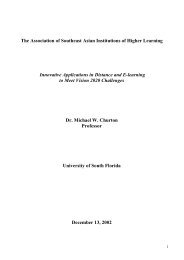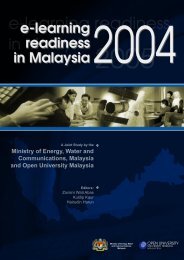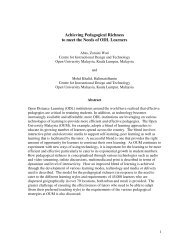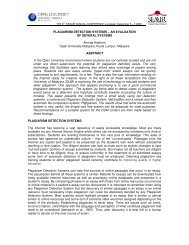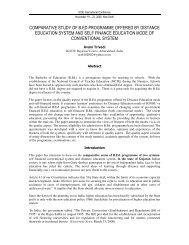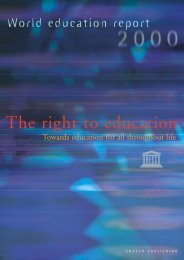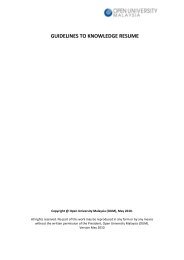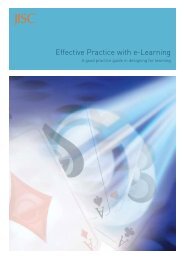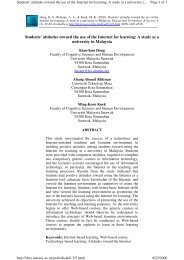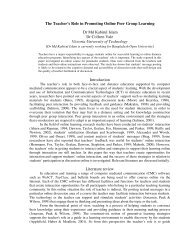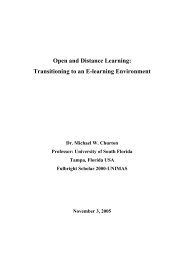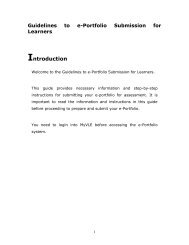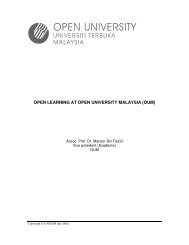lifelong learning and distance higher education - Asia Pacific Region
lifelong learning and distance higher education - Asia Pacific Region
lifelong learning and distance higher education - Asia Pacific Region
- No tags were found...
You also want an ePaper? Increase the reach of your titles
YUMPU automatically turns print PDFs into web optimized ePapers that Google loves.
Educational Planning has been responsible for the evaluation of the project. The Divisionof Higher Education, UNESCO Education Sector has been responsible for the contentdevelopment of the knowledge base <strong>and</strong> the management of the project.In addition, contacts with COL were established to make synergies with the GlobalDistance Education Network (GDENet) project managed by COL <strong>and</strong> the World Bank.As part of the co-operation with COL, the project has incorporated the COL KnowledgeFinder tool as a search mechanism for the project. Furthermore, the HEODLKB projecthas developed a common taxonomy with the GDENet project in order to facilitate thesharing of resources between the two projects.The project team met three times since 2002 to clarify the project objectives <strong>and</strong>activities, <strong>and</strong> to plan future activities. It also held several telephone meetings <strong>and</strong>bilateral meetings among project team members. Furthermore an external evaluator forthe project was contracted at the end of the first project phase. Project planning was basedon the evaluation of the first project phase <strong>and</strong> the monitoring <strong>and</strong> evaluation strategy ofthe second project phase. These interactions proved to be very important for clarifyingproject activities <strong>and</strong> goals, <strong>and</strong> ensuring coherence in the different regional activities.In 2002, the project carried out a needs analysis of the existing ODL decision-makingresources <strong>and</strong> priority information needs in the target regions. The results of this analysishighlighted the need for information on quality assurance of ODL that responded toregion-specific needs.The first project phase (2002-2003) identified the regional implementing partners<strong>and</strong> clarified the role of information processing tools that could be useful to reach theproject objectives. The primary focus of the first phase of the project was the technicaldevelopment of the DST. During this first phase, the project examined existingcomputerised information resources on ODL <strong>and</strong> reviewed potential knowledgemanagement applications for policy-makers. It looked at a range of software systems thatcould be developed for supporting users in extracting, organising <strong>and</strong> managing relevantinformation on ODL. From this exercise a first prototype was developed with contentsfocusing on quality assurance of <strong>distance</strong> <strong>higher</strong> <strong>education</strong>. This tool was tested at theTraining Workshop for Policy Makers on the Open <strong>and</strong> Distance Learning <strong>and</strong> ExpertSystem (Shanghai, China, November 2003). This event was organised by UNESCOBangkok, a member of the Project Team, <strong>and</strong> hosted by the Shanghai TV University.Participants included policy-makers at the institutional <strong>and</strong> governmental level from18 countries in the <strong>Asia</strong> <strong>and</strong> <strong>Pacific</strong> <strong>Region</strong>. The participants found the prototype tooprescriptive <strong>and</strong> called for support that focused more closely on their region-specificneeds with links to the regional databases. In addition the need for user-friendliness washighlighted.An important step for the project was to make a clear distinction between the twodifferent roles of ICTs for <strong>education</strong>: (1) to support decision-making in <strong>education</strong>; (2) todeliver <strong>education</strong>al content. Once this distinction was explicitly made, the responsibilityfor the development of the DST was split between the Educational <strong>and</strong> Communication<strong>and</strong> Information specialists.In the second phase of the project (2004-2005), the project team decided that the DSTwould be tied integrally to the regional information databases. The technical <strong>and</strong> contentaspects of the DST were completely separately in the second phase. For the technicaldevelopment, the prototype was revised taking into account the recommendationsof the Shanghai 2003 evaluation. This technical development was undertaken by theimplementing partner in the Africa <strong>Region</strong>, SAIDE. The content aspect of the DST was100



